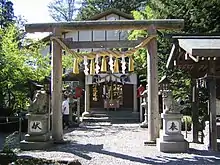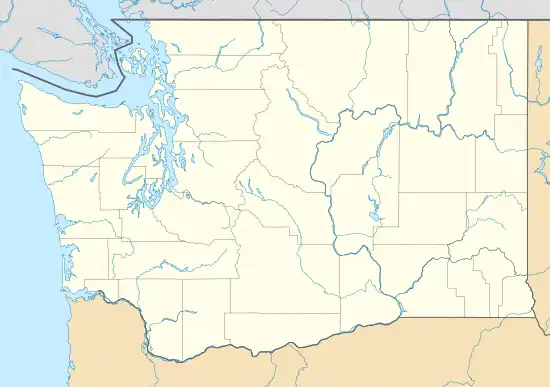Tsubaki Grand Shrine of America
Tsubaki Grand Shrine of America, also sometimes known as Tsubaki America Jinja or in Japanese as amerika tsubaki ōkamiyashiro (アメリカ椿大神社), was the first Shinto shrine built in the mainland United States after World War II. It was erected in 1986 in Stockton, California, and moved to its location next to the Pilchuck River in Granite Falls, Washington, in 2001.[1][2]
| Tsubaki Grand Shrine of America アメリカ椿大神社 | |
|---|---|
 | |
| Religion | |
| Affiliation | Shinto |
| Deity | Sarutahiko-no-Ōkami Ame-no-Uzume-no-Mikoto |
| Leadership | Rev. Koichi Barrish |
| Location | |
| Location | 17720 Crooked Mile Road Granite Falls, Washington 98252 United States |
 Shown within Washington (state)  Tsubaki Grand Shrine of America (the United States) | |
| Geographic coordinates | 48°4′51.88″N 121°59′33.19″W |
| Architecture | |
| Date established | 1987 |
| Website | |
| www | |
Gosaijin (enshrined Kami/Spirits) of Tsubaki Grand Shrine of America were Sarutahiko-no-Ōkami, ancestor of all earthly Kami and Kami of progressing positively in harmony with Divine Nature; and his wife Ame-no-Uzume-no-Mikoto, Kami of arts and entertainment, harmony, meditation and joy.[3] Also enshrined were Amaterasu Ōmikami (Kami of the Sun), Ugamitama-no-Ōkami (Kami of foodstuffs and things to sustain human life/Oinarisama), America Kokudo Kunitama-no-Kami (protector of the North America Continent) and Ama-no-Murakumo-Kuki-Samuhara-Ryu-O (Kami of Aikido).
Tsubaki Grand Shrine of America was a branch of Tsubaki Ōkami Yashiro, one of the oldest and most notable shrines in Japan.[4] The Guji (Head Priest) was Rev. Koichi Barrish, the first non-Japanese priest in Shinto history.[3][5] The Board of Directors closed the shrine in 2023.[6]
Gallery
 Torii at the entrance from the road
Torii at the entrance from the road A lantern
A lantern
 Two Magatama
Two Magatama A hokora along the stream
A hokora along the stream Frog statues in front of a statue of Ame no Uzume
Frog statues in front of a statue of Ame no Uzume Sculptures
Sculptures Shofuku no Tama
Shofuku no Tama Torii into a Setsumatsusha
Torii into a Setsumatsusha Magatama
Magatama

 The main Torii
The main Torii Torii reverse from the main Torii
Torii reverse from the main Torii
References
- "Tsubaki Grand Shrine of America: Shrine History". Retrieved 2020-04-27.
- Ishida, Sarah Spaid (2008). The Making of an American Shinto Community (PDF) (MA). University of Florida. pp. 86–87.
- Ramella, Sueann (2013-10-08). "What's So Special About This Shinto Shrine? The Priest Isn't Japanese, But That's Not All". Northwest Public Broadcasting.
- Rots, Aike P. (2017). Shinto, Nature and Ideology in Contemporary Japan: Making Sacred Forests. Bloomsbury Academic. p. 200. ISBN 978-1474289931.
- Ishida, Sarah Spaid (2008). The Making of an American Shinto Community (PDF) (MA). University of Florida. p. 7.
- Kiley, Brendan (April 28, 2023). "How one of the country's largest Shinto shrines ended up in tiny Granite Falls". The Seattle Times. Retrieved May 2, 2023.